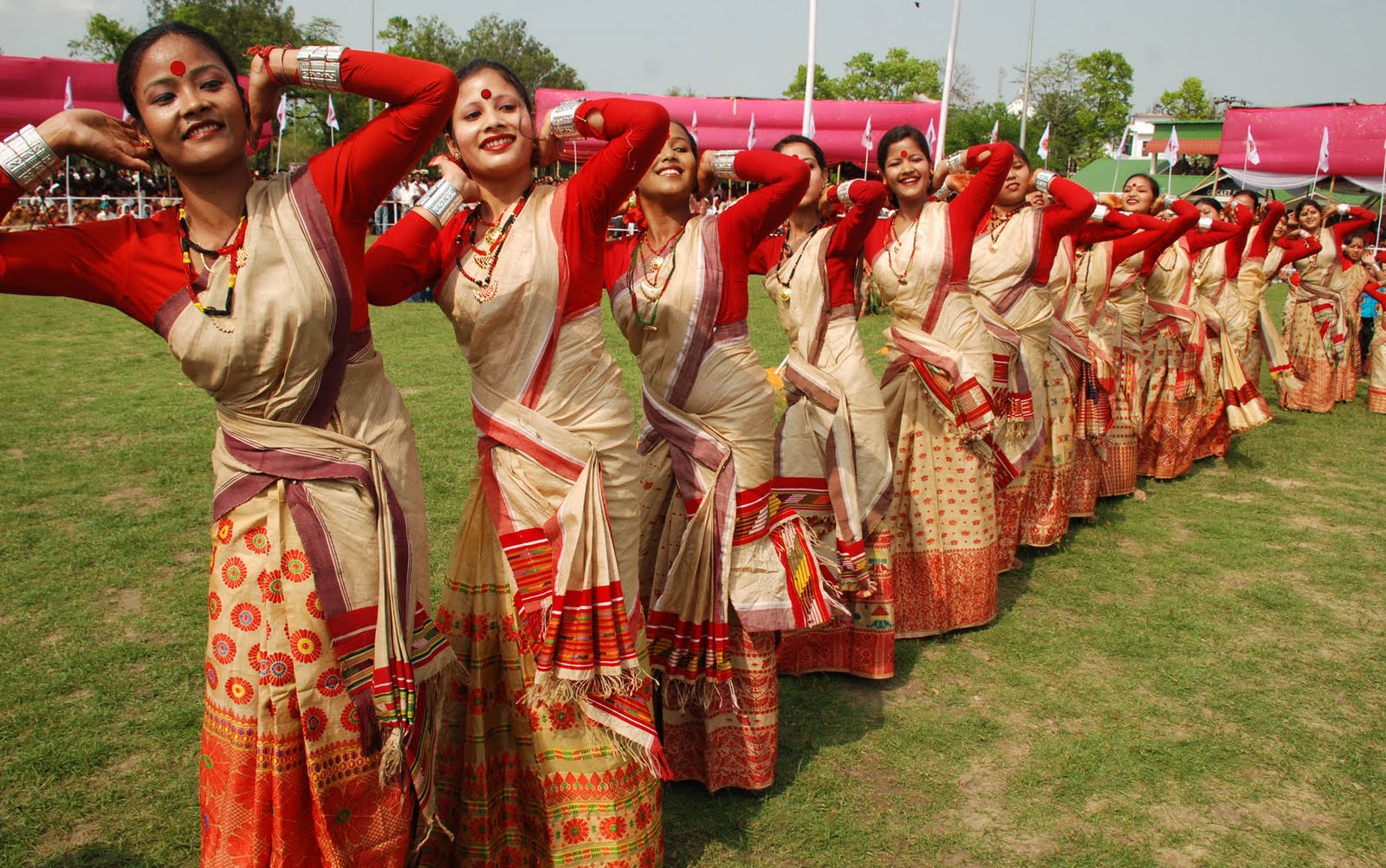Bohag Bihu | Rangali Bihu

The three Bihu observed by the people of Assam at three different phases of agricultural operation during a year may constitute a festival complex. The Bohag Bihu or Rongali Bihu, a part of the annual Bihu festival, has been causing the largest amount of stir among the people of this region irrespective of caste-creed, color, religion, and language since time immemorial.
The Rangali Bihu marks the first day of the Hindu solar calendar and is also observed in Mithila, Bengal, Manipur, Nepal, Orissa, Punjab, Kerala, and Tamil Nadu though called by different names. It coincides with Vaisakhi in north India observed by Sikhs and Hindus, and Hindu festivals with similar significance are known by many other names in different parts of India, such as Vishu in Kerala, Poila Boishakh in Bengal.
Rangali Bihu will start on April 14 and ends on April 20, 2025.
Seven Days of Festival
Rangali Bihu is celebrated for 7 days which are Raati Bihu, Chot Bihu, Goru Bihu, Manuh Bihu, Kutum Bihu, Mela Bihu, and Chera Bihu. The Assamese new year usually falls on April 15 and is very dear as well as important for Assamese people and celebrated in every nook and corner of the state.
The first day of Rangali Bihu is Raati Bihu and is the first day of Chot months. The second day is Chot Bihu when people celebrate with performances with singing and dancing. Goru Bihu is related to the worshipping of livestock when the cows and bullocks are worshipped.
Manuh Bihu falls on the first day of Vaisakh month which is on April 15th, this is the day of getting cleaned up, wearing new clothes, celebrating, and getting ready for the New Year with fresh vigor. The next day is Kutum Bihu when people visit their relatives and friends’ houses as ‘Kutum’ symbolizes family.
Mela Bihu is marked by cultural events, fairs, and competitions. These fairs and events are attended by people from all over Assam. Last is Chera Bihu also called Bohagi Bidai, this festival is a spectacle worth experiencing from start to finish.
Celebration
Bohag or Rongali Bihu, the most important, is celebrated in the middle of April. It marks the Assamese New Year and coincides with the advent of spring and seeding time. At Bohag Bihu (which also marks the Assamese new year) and Magh Bihu (the harvest festival), young women dressed in colorful traditional festive costumes woven out of pure muga (silk) dance and are accompanied with wild and lusty beats from the men dressed in dhoti (baggy white pants) with gamuchas (traditional scarves) tied around their foreheads playing the dhol and pepa.
The dhol is an essential part of Bihu. It maintains the rhythm and is similar to an Indian drum, played with two sticks, and made out of a wooden barrel. The two open ends are covered with animal skin. Tightening or loosening the skin with ropes or nuts and bolts adjusts the pitch. The dhol dates back to the 15th century when it was played during wartime.
The pepa, a chunky flute-like instrument, is also played during Bihu. It is made from a buffalo horn with a short tapering stem of bamboo, cane, or reed as the mouthpiece. The first phase of Bohag Bihu is dedicated to cattle. They are smeared with mustard oil and then taken to the nearest pond or river for a ceremonial bath. The people, too, take a bath in the river. The first part of the dance consists of Husari Kirtans (religious songs). One man sets the refrain, which is soon picked up by the rest, and young men only perform the dance in a circle.
Both young men and women take place in all the other Bihu dances where the songs are often loved ditties which are sung in couplets and often performed in the fields and under trees. Both men and women play clappers called taka and the dancers form circles, rows, and figures of eight (representing the motif of intertwined serpents).
During the second phase of Bohag Bihu villagers don new clothes, exchange gifts and visit relatives and friends in groups and perform Bihu dances in the open.
Bohag Bihu Wishes | Assamese New Year Greetings
